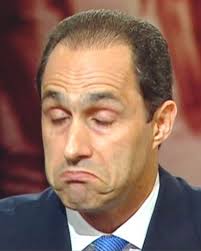WINEP:
"... Assuming that Egypt continues to follow constitutional processes but bypasses Gamal, who could become the next president? One fact is clear: the new amendments ensure a limited pool of candidates and create an almost insurmountable obstacle for independents. This includes a broad range of personalities that the ruling party currently frowns upon, such as Mohamed ElBaradei, Ayman Nour, and any candidate from the Muslim Brotherhood.
The most frequently suggested establishment names come from within the current NDP leadership, including Secretary-General Safwat al-Sharif and Prime Minister Ahmed Nazif. Among non-NDP party leaders, possible contenders include El Sayed El Badawy, current head of the Wafd Party, as well as Rifaat Said, head of the Tagammua Party.
Other establishment candidates have been suggested outside the party leaderships. Omar Suleiman, the current head of Egyptian intelligence, is the favorite for many in Cairo (and Washington) who prefer backrooms and gray hair to Gamal's youth and inexperience. Ahmed Shafiq, current minister for civil aviation and former commander of the Egyptian air force, is credited with successfully building Cairo's new international airport. Featured prominently in an April 2010 al-Dustour article, he is reportedly close to President Mubarak, himself an air force man. Defense Minister Muhammad Hussein Tantawi, reportedly chosen for the post by Mubarak because of his loyalty (and lack of political ambition), is a taciturn, unimaginative interlocutor for U.S. diplomats and has not been perceptibly active in Egypt's domestic politics. All of these men would have to run as "independents" to comply with the law and be supported by the NDP as such.
Aside from establishment candidates, it is difficult to envision how truly independent candidates such as ElBaradei would be able to run under the existing system......
Securing U.S. Interests during Transition
Although the identity of Mubarak's successor is uncertain, the next president in Cairo will likely appreciate Egypt's relationship with the United States, have had some contact with U.S. diplomats, and be insecure in his new role at first. This will create both opportunities and risks for the United States.
Citing American security interests, many within the so-called "realist" camp will be tempted to embrace any successor chosen by elites in the Egyptian establishment. But the United States also has an interest in seeing a peaceful transition that is consistent with both long-term American interests and the aspirations of the Egyptian people. Indeed, retaining a strong partnership with Egypt will be heavily contingent on the nature of the transition. Toward that end, Washington should reiterate early and often that it does not have a preferred candidate but expects the succession process to be open, transparent, and in accordance with international standards, with the people given a meaningful opportunity to participate in the choosing of their next leader. And if the transition is marked by violence or intimidation, the United States must be prepared to comment on it. The audience for America's message will be the Egyptian people as much as the new Egyptian leader.
Washington should also prepare for the possibility of a new president who seeks to bolster domestic legitimacy by adopting more populist foreign policies. This could be the case with an untested establishment candidate (e.g., Gamal Mubarak) or in the highly unlikely scenario that some outsider manages to win the post. In fact, ElBaradei hinted at such an approach during a recent Der Spiegel interview, suggesting that the permanent opening of the Rafah border crossing with Gaza would not be injurious to Egyptian security, and that the West's concerns about a nuclear Iran are overblown. This tack seems inspired by Turkish prime minister Recep Tayyip Erdogan, a man ElBaradei has praised as an "Arab hero." If the next president in Cairo adopts such populism, Egypt's chilly peace with Israel would become even more frigid.
In light of these challenges, the future transition will require deft U.S. diplomacy. On the one hand, Washington must publicly identify with the Egyptian people's political aspirations, while on the other hand ensuring the survival of the strategic partnership that has been so important to U.S. national security.
Conclusion
Egypt is at a crossroads. For three decades, President Mubarak has been a stabilizing force within both Egypt and U.S.-Egyptian relations -- so much so that domestic political development has been stunted. His passing will mark the end of an era, likely forcing his successor to search for a new basis of legitimacy at home and a stronger foundation for the bilateral partnership. Beginning with Mubarak's upcoming trip to Washington next week and continuing throughout the coming months, the United States has an opportunity to ensure that its policy is clearly understood by the people and ruling elite alike, so that America's position in Egypt after transition is at least as strong -- if not stronger -- than it is today. "

No comments:
Post a Comment